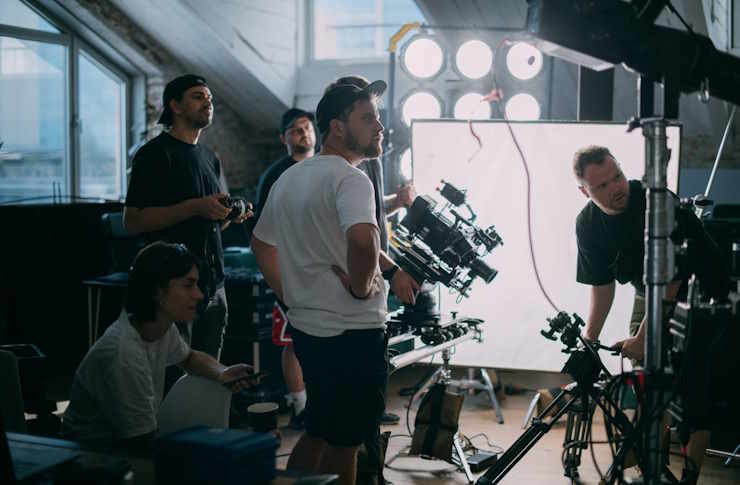Camera courses: your first step to a successful film career
Entering the film industry requires a blend of creativity, technical knowledge, and practical experience. Camera courses serve as foundational training grounds where aspiring filmmakers learn essential skills that shape their understanding of visual storytelling. Beyond just learning how to operate equipment, these educational programs introduce students to industry standards, creative techniques, and the collaborative nature of filmmaking, providing a structured pathway into a competitive but rewarding field.

How camera courses introduce essential film industry skills
Camera courses typically begin by teaching the fundamentals of visual composition, equipment handling, and technical specifications. Students learn about different camera types, from entry-level DSLRs to professional cinema cameras, understanding how each serves different production needs. These courses cover crucial concepts like aperture, shutter speed, ISO, and white balance—technical elements that directly impact the visual quality of any production. Additionally, students practice camera movement techniques such as panning, tilting, tracking shots, and the increasingly popular gimbal-based stabilization methods that have become industry standards.
Beyond technical operation, camera courses emphasize the importance of visual literacy—the ability to communicate effectively through images. Students analyze film scenes to understand how framing choices, camera angles, and movement convey emotion and advance storytelling. This foundational knowledge applies across all areas of filmmaking, making camera courses valuable regardless of which specialization a student might eventually pursue.
The insights into filmmaking gained through camera training
Camera training extends far beyond equipment operation, offering profound insights into the filmmaking process as a whole. Students quickly discover that cinematography involves creative decision-making that influences the entire production. Through hands-on projects, they learn how lighting setups, lens choices, and camera positioning work together to establish mood, tone, and visual identity for a film.
Camera courses also reveal the collaborative nature of film production. Students learn that cinematographers must work closely with directors to realize a shared vision, with production designers to ensure visual cohesion, and with editors who will assemble the captured footage. This collaborative experience teaches communication skills and professional etiquette that prove invaluable on real-world sets. Many camera courses incorporate small-scale productions where students rotate through different roles, gaining appreciation for the interconnected nature of filmmaking departments.
Camera courses as the foundation of creative film education
The skills learned in camera courses form the building blocks of more advanced film education. Understanding camera operation and visual composition creates a framework upon which students can layer more specialized knowledge. As they progress, students can explore specific genres like documentary filmmaking, commercial production, or narrative storytelling, always building upon their core camera competencies.
These foundational courses also help students discover their creative voice and technical preferences. Some may find they excel at dramatic lighting techniques, while others might develop a talent for dynamic camera movement or documentary-style observation. This self-discovery guides future educational choices and career paths, whether toward roles as directors of photography, camera operators, directors, or other visual storytelling positions.
The real-world economics of camera courses and education
Cinematography education varies widely in cost, format, and duration, creating options for different budgets and career goals. Understanding these financial considerations is crucial for planning your educational path in the film industry.
| Education Type | Duration | Approximate Cost (USD) | Key Benefits |
|---|---|---|---|
| University Film Programs | 2-4 years | $20,000-$80,000+ (total) | Comprehensive education, networking, equipment access, degree |
| Film Schools (Dedicated) | 1-3 years | $15,000-$50,000 (total) | Industry-focused curriculum, connections, portfolio development |
| Community College Programs | 1-2 years | $2,000-$10,000 (total) | Affordable foundation, transferable credits, basic equipment |
| Certificate Programs | 3-12 months | $1,500-$15,000 | Specialized skills, faster completion, industry instructors |
| Online Courses | Self-paced | $10-$2,000 per course | Flexibility, specific skill development, learn at own pace |
| Workshops & Bootcamps | 1-14 days | $500-$5,000 | Intensive learning, networking, specific camera systems |
Prices, rates, or cost estimates mentioned in this article are based on the latest available information but may change over time. Independent research is advised before making financial decisions.
Beyond tuition, aspiring cinematographers should consider supplementary costs including equipment purchases or rentals, software subscriptions for editing programs, and production expenses for student projects. Many students start with entry-level cameras ($500-$2,000) and gradually invest in professional equipment as their skills develop. Additionally, budgeting for film festival submissions, portfolio development, and potential relocation to production hubs like Los Angeles, New York, or Atlanta represents important long-term financial planning for a film career.
From learning to earning: career prospects after camera courses
Camera courses create pathways to various career opportunities within the film and media industries. Most graduates begin as production assistants, camera assistants, or equipment room technicians, positions that provide on-set experience and networking opportunities while paying entry-level wages ($200-500 per day, depending on location and production size). With experience and continued learning, advancement to camera operator, director of photography, or specialized roles like drone operator becomes possible.
The digital media revolution has expanded career opportunities beyond traditional film sets. Graduates with camera skills find work in corporate video production, social media content creation, live events, and streaming platforms. Many successful cinematographers combine client work with personal projects, gradually building reputations through portfolio development and industry relationships. While the competitive nature of film careers means persistence is essential, those who combine technical proficiency with creative vision and professional networking can build sustainable careers with growth potential.
Conclusion
Camera courses provide more than technical instruction—they offer a comprehensive introduction to the visual language and collaborative process of filmmaking. Through structured learning and hands-on practice, students develop both tangible skills and creative perspectives that form the foundation for various career paths in the film industry. Whether through formal education or intensive workshops, these courses represent an essential first step in transforming cinematic passion into professional capability, preparing students for the challenges and opportunities of this dynamic creative field.




